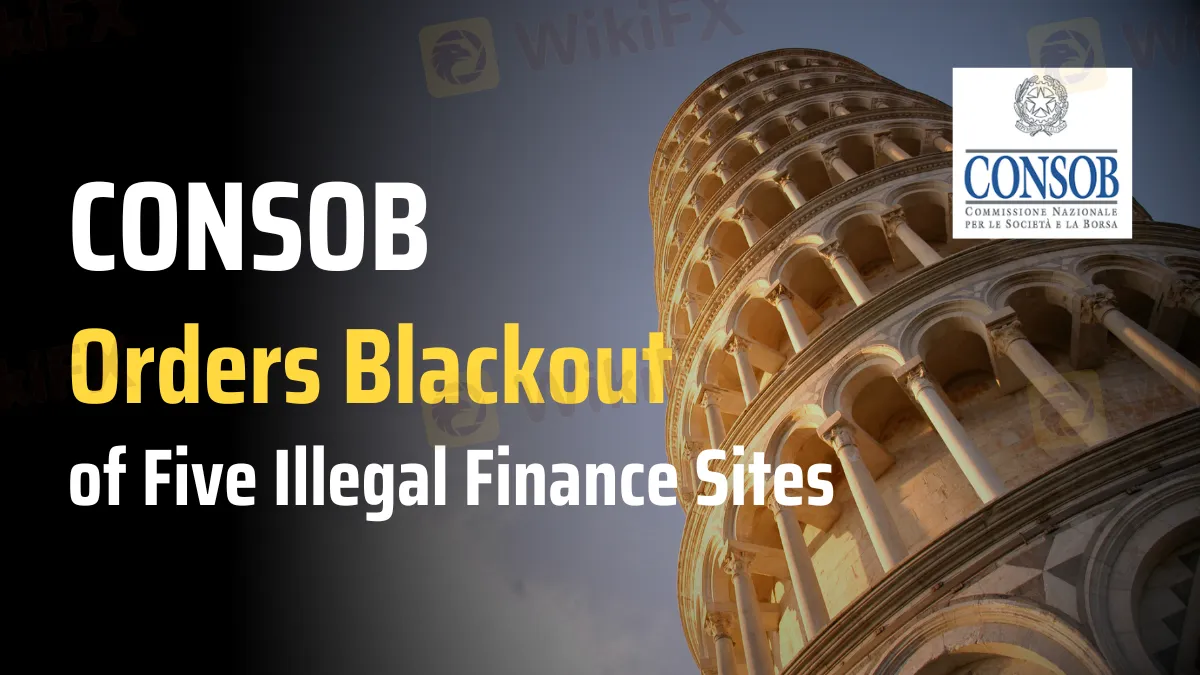简体中文
繁體中文
English
Pусский
日本語
ภาษาไทย
Tiếng Việt
Bahasa Indonesia
Español
हिन्दी
Filippiiniläinen
Français
Deutsch
Português
Türkçe
한국어
العربية
CONSOB Orders Blackout of Five Illegal Finance Sites
Abstract:Italy's CONSOB intensifies the crackdown on unregulated financial sites, blacking out five new domains for illegal activities.

The Italian Companies and Exchange Commission (CONSOB) has increased its efforts against unlicensed financial activities by blocking five new websites, a bold step to protect investors from fraudulent schemes. CONSOB, which has been in charge of preventing financial crime on digital platforms since July 2019, maintains its attentive approach with this decision.
Four of the targeted websites have engaged in illicit financial intermediation, and one has advertised financial goods without the required legal paperwork. The websites that were found were specifically “Shellinvestments,” “TradeONTOP Limited,” “Xtrader365,” “CFD Active,” and “High BTC Stock.” These platforms offered a wide range of financial goods and services, including unregulated investment opportunities and complex financial instruments like Contracts for Difference (CFDs), which were all advertised without the necessary authorization or oversight under Italian law.
Since receiving the authority to immediately intervene by blocking phony financial websites almost five years ago, CONSOB has blocked access to a total of 1075 websites. This noteworthy figure highlights the continued difficulties and complications in policing the fast-developing online financial industry, where new websites may appear quickly and often escape discovery.

Blacking out these websites entails making them inaccessible from inside Italy to shield Italian investors from possible fraud and monetary losses. This action is a component of a larger regulatory framework designed to improve the online financial market's security and transparency.
CONSOB's most recent enforcement action serves as an important warning to investors to exercise prudence while investing money on online platforms. The regulatory authority cautions against investing in offerings where no appropriate financial prospectus has been issued and strongly suggests confirming if a financial service provider is formally permitted. These actions are essential for protecting investments and are cornerstones of prudent financial conduct.
In addition to highlighting the continuous regulatory issues raised by the digital financial sector, CONSOB has taken this action to show that it is committed to safeguarding customers and upholding the integrity of Italy's financial system. With the development of online platforms, the importance of regulating agencies such as CONSOB in guaranteeing the authenticity and openness of financial transactions is increasing.
In summary, CONSOB's shutdown of these websites is a significant move in the direction of stifling the unchecked financial industry, which has grown rapidly since the invention of digital technology. This enforcement action strengthens the regulator's ongoing mission to stop financial fraud and safeguard investors from unapproved and potentially deceptive financial activity. The regulatory authorities' attention will be critical in ensuring a safe and stable financial environment for all parties involved as the digital landscape evolves.

Disclaimer:
The views in this article only represent the author's personal views, and do not constitute investment advice on this platform. This platform does not guarantee the accuracy, completeness and timeliness of the information in the article, and will not be liable for any loss caused by the use of or reliance on the information in the article.
Related broker
Read more

The Hidden Checklist: Five Unconventional Steps to Vet Your Broker
Forex broker scams continue to evolve, employing new tactics to appear credible and mislead unsuspecting traders. Identifying these fraudulent schemes requires vigilance and strategies beyond the usual advice. Here are five effective methods to help traders assess the legitimacy of a forex broker and avoid potential pitfalls.

Doo Financial Obtains Licenses in BVI and Cayman Islands
Doo Financial, a subsidiary of Singapore-based Doo Group, has expanded its regulatory footprint by securing new offshore licenses from the British Virgin Islands Financial Services Commission (BVI FSC) and the Cayman Islands Monetary Authority (CIMA).

CFI’s New Initiative Aims to Promote Transparency in Trading
A new programme has been launched by CFI to address the growing need for transparency and awareness in online trading. Named “Trading Transparency+: Empowering Awareness and Clarity in Trading,” the initiative seeks to combat misinformation and equip individuals with resources to evaluate whether trading aligns with their financial goals and circumstances.

Malaysian-Thai Fraud Syndicate Dismantled, Millions in Losses Reported
The Royal Malaysia Police (PDRM) has received 26 reports concerning the Nicshare and CommonApps investment schemes, both linked to a major fraudulent syndicate led by a Malaysian citizen. The syndicate’s activities came to light following the arrest of its leader by Thai authorities on 16 December.
WikiFX Broker
Latest News
AIMS Broker Review
The Hidden Checklist: Five Unconventional Steps to Vet Your Broker
Russia to Fully Ban Crypto Mining in 10 Regions Starting January 1, 2025
YAMARKETS' Jingle Bells Christmas Offer!
Why is there so much exposure against PrimeX Capital?
Doo Financial Expands Regulatory Reach with Offshore Licenses in BVI and Cayman Islands
MTrading’s 2025 "Welcome Bonus" is Here
Doo Financial Obtains Licenses in BVI and Cayman Islands
CFI’s New Initiative Aims to Promote Transparency in Trading
Currency Calculator


